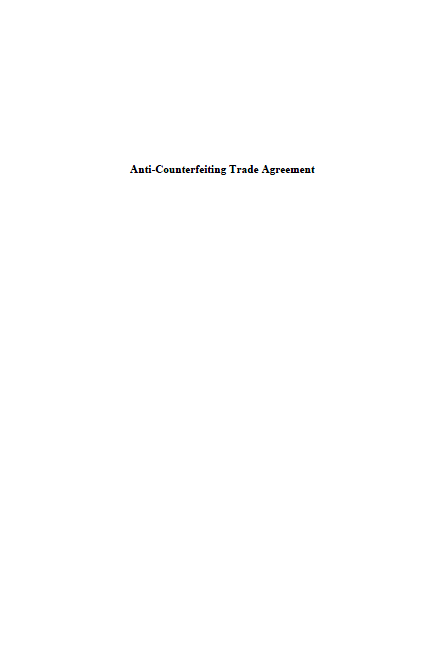The following is the most recent version of the Anti-Counterfeiting Trade Agreement. It was made available in May 2011 by the European Commission. Previous draft versions of the treaty are also available.
Anti-Counterfeiting Trade Agreement Final Version
- 25 pages
- May 2011
The Parties to this Agreement,
Noting that effective enforcement of intellectual property rights is critical to sustaining economic growth across all industries and globally;
Noting further that the proliferation of counterfeit and pirated goods, as well as of services that distribute infringing material, undermines legitimate trade and sustainable development of the world economy, causes significant financial losses for right holders and for legitimate businesses, and, in some cases, provides a source of revenue for organized crime and otherwise poses risks to the public;
Desiring to combat such proliferation through enhanced international cooperation and more effective international enforcement;
Intending to provide effective and appropriate means, complementing the TRIPS Agreement, for the enforcement of intellectual property rights, taking into account differences in their respective legal systems and practices;
Desiring to ensure that measures and procedures to enforce intellectual property rights do not themselves become barriers to legitimate trade;
Desiring to address the problem of infringement of intellectual property rights, including infringement taking place in the digital environment, in particular with respect to copyright or related rights, in a manner that balances the rights and interests of the relevant right holders, service providers, and users;
Desiring to promote cooperation between service providers and right holders to address relevant infringements in the digital environment;
Desiring that this Agreement operates in a manner mutually supportive of international enforcement work and cooperation conducted within relevant international organizations;
Recognizing the principles set forth in the Doha Declaration on the TRIPS Agreement and Public Health, adopted on 14 November 2001, at the Fourth WTO Ministerial Conference;
Hereby agree as follows:
…
pirated copyright goods means any goods which are copies made without the consent of the right holder or person duly authorized by the right holder in the country of production and which are made directly or indirectly from an article where the making of that copy would have constituted an infringement of a copyright or a related right under the law of the country in which the procedures set forth in Chapter II (Legal Framework for Enforcement of Intellectual Property Rights) are invoked;
…
ARTICLE 9: DAMAGES
1. Each Party shall provide that, in civil judicial proceedings concerning the enforcement of intellectual property rights, its judicial authorities have the authority to order the infringer who, knowingly or with reasonable grounds to know, engaged in infringing activity to pay the right holder damages adequate to compensate for the injury the right holder has suffered as a result of the infringement. In determining the
amount of damages for infringement of intellectual property rights, a Party’s judicial authorities shall have the authority to consider, inter alia, any legitimate measure of value the right holder submits, which may include lost profits, the value of the infringed goods or services measured by the market price, or the suggested retail price.2. At least in cases of copyright or related rights infringement and trademark counterfeiting, each Party shall provide that, in civil judicial proceedings, its judicial authorities have the authority to order the infringer to pay the right holder the infringer’s profits that are attributable to the infringement. A Party may presume those profits to be the amount of damages referred to in paragraph 1.
…
ARTICLE 11: INFORMATION RELATED TO INFRINGEMENT
Without prejudice to its law governing privilege, the protection of confidentiality of information sources, or the processing of personal data, each Party shall provide that, in civil judicial proceedings concerning the enforcement of intellectual property rights, its judicial authorities have the authority, upon a justified request of the right holder, to order the infringer or, in the alternative, the alleged infringer, to provide to the right holder or to the judicial authorities, at least for the purpose of collecting evidence, relevant information as provided for in its applicable laws and regulations that the infringer or alleged infringer possesses or controls. Such information may include information regarding any person involved in any aspect of the infringement or alleged infringement and regarding the means of production or the channels of distribution of the infringing or allegedly infringing goods or services, including the identification of third persons alleged to be involved in the production and distribution of such goods or services and of their channels of distribution.
…
ARTICLE 19: DETERMINATION AS TO INFRINGEMENT
Each Party shall adopt or maintain procedures by which its competent authorities may determine, within a reasonable period after the initiation of the procedures described in Article 16 (Border Measures), whether the suspect goods infringe an intellectual property right.
ARTICLE 20: REMEDIES
1. Each Party shall provide that its competent authorities have the authority to order the destruction of goods following a determination referred to in Article 19 (Determination as to Infringement) that the goods are infringing. In cases where such goods are not destroyed, each Party shall ensure that, except in exceptional circumstances, such goods are disposed of outside the channels of commerce in such a manner as to avoid any harm to the right holder.
2. In regard to counterfeit trademark goods, the simple removal of the trademark unlawfully affixed shall not be sufficient, other than in exceptional cases, to permit release of the goods into the channels of commerce.
3. A Party may provide that its competent authorities have the authority to impose administrative penalties following a determination referred to in Article 19 (Determination as to Infringement) that the goods are infringing.

